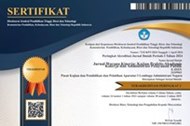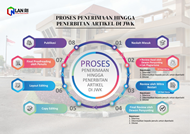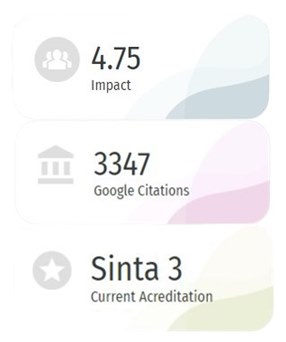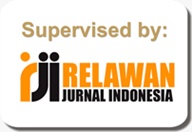Efektivitas Pelayanan Jaminan Kesehatan Berbasis Elektronik pada Kantor Badan Penyelenggara Jaminan Sosial (BPJS) Kesehatan Kabupaten Karawang
Abstract
This study aims to evaluate the effectiveness of electronic services provided by BPJS Kesehatan in Karawang Regency. The electronic services are expected to facilitate public access to services such as membership registration, health facility transfers, and others online, without the need to visit the BPJS Kesehatan office in Karawang Regency. However, the use of these electronic services remains limited among the people of Karawang Regency. This study employs a qualitative approach to gain an in-depth understanding of the issues surrounding the effectiveness of BPJS Kesehatan’s electronic services in Karawang Regency. Data collection and analysis refer to Effectiveness Theory. The study utilizes data from BPJS Kesehatan staff in Karawang Regency and BPJS participants in the area, with data gathered through observation, interviews, documentation, and literature review. The findings indicate that the electronic services provided by BPJS Kesehatan in Karawang Regency are not yet effective. The outreach efforts have not optimally increased public understanding, are not well-targeted, and there are system issues that slow down service delivery. The goal of electronic services—to provide easy, fast, and equitable access—has not yet been achieved, meaning the expected changes in the community have not materialized. To enhance service effectiveness, it is recommended to broaden well-targeted outreach efforts, conduct regular system maintenance, and collaborate with relevant agencies in Karawang Regency and the community so that the goals of electronic services can be achieved and bring about positive change for the public.
Keywords
References
Androutsopoulou, A., Karacapilidis, N., Loukis, E., & Charalabidis, Y. (2019). Transforming the communication between citizens and government through AI-guided chatbots. Government Information Quarterly, 358-367.
Azizah, A. R., & Najicha, F. U. (2022). Law, Development & Justice, 237-247.
Creswell, J. W., & Creswell, J. D. (2018). Fifth Edition Research Design: Qualitative, Quantitative, and Mixed Methods Aproaches. University of Michigan : Sage Publications.
Compton, M. E., Young , M. M., Bullock, J. B., & Greer, R. (2022). Administrative Errors and Race: Can Technology Mitigate Inequitable Administrative Outcomes?. Journal of Public Administration Research and Theory, 512-528.
Fadhila, R., & Afriani, T. (2020). Penerapan Telenursing dalam Pelayanan Kesehatan: Literature Review. JKA: Jurnal Keperawatan Abdurrab, 77-84.
Fischer , C., Siegel, J., Proeller, I., & Drathschmidt, N. (2022). Resilience through digitalisation: How individual and organisational resources affect public employees working from home during the COVID-19 pandemic. Public Management Review, 808-835.
Gitosudarmo, I. (2001). Manajemen Strategi. Yogyakarta: BPFE Yogyakarta.
Henman, P. (2020). Improving Public Services Using Artificial Intelligence: Possibilities, Pitfalls, Governance. Asia Pacific Journal of Public Administration, 1-13.
Hikmawati, F. (2017). Metodologi Penelitian. Depok: Rajagrafindo Persada.
Judijanto, L., Putra, H. N., Zani, B. N., Hasyim, D. M., & Mustasir. (2024). E-Health and Digital Transformation in Increasing Accessibility of Health Services. Journal of World Future Medicine Health and Nursing , 132-145.
Kencana, I. (2003). Birokrasi Pemerintahan Indonesia. Bandung: Mandjar Maju.
Kerkhoff, A. D. (2016). Public Value Dynamics. In Global Encyclopedia of Public Administration, Public Policy, and Governance, 1-9.
Lindgren, I., & Jansson, G. (2013). Electronic services in the public sector: A conceptual framework. Government Information Quarterly, 163-172.
Lindgren, I., Madsen, C. Ø., Hofmann, S., & Melin, U. (2019). Close encounters of the digital kind: A research agenda for the digitalization of public services. Government Information Quarterly, 427-436.
Mahmudi. (2010). Manajemen Kinerja Sektor Publik: Edisi Kedua. Yogyakarta: UPP STIM YKPN.
Makasi, T., Nili, A., Desouza, K. C., & Tate, M. (2020). Chatbot-Mediated Public Service Delivery: A Public Service Value-Based Framework. First Monday, 25, 12.
Maulidiah, S. (2014). Pelayanan Publik: pelayanan Administrasi Terpadu Kecamatan (PATEN). Bandung: Indra Prahasta.
Mergel, I., Dickinson, H., Stenvall, J., & Gasco, M. (2023). Implementing Al in The Public Sector. Public Management Review, 1-14.
Moynihan, D., Herd, P., & Harvey, H. (2015). Administrative Burden: Learning, Psychological, and Compliance Costs in Citizen-State Interactions. Journal of Public Administration Research and Theory, 44-69.
Mulyawan, R. (2016). Birokrasi dan Pelayanan Publik. Unpad Press.
Nahdiana, Unde, A., Nasir, S., & Amar, Y. (2022). Peningkatan Kepuasan Peserta Terhadap Layanan Informasi BPJS Kesehatan melalui Media: Apakah Efektif? Jurnal Ilmu Komunikasi, 238-248.
Nasional, D. J. (2022). Statistik JKN 2016-2021. Jakarta: BPJS Kesehatan.
Nuraeni, N., Nurhazizah, R., Nursahwa, S., & Apriliani, A. (2024). Menciptakan Good Governance melalui Pelayanan Kesehatan kepada Masyarakat. Karimah Tauhid, 2412-2423.
Putri, A. E. (2014). Paham BPJS: Badan Penyelenggara Jaminan Sosial. Jakarta: Friedrich-EbertStiftung.
Putri, T. K., Irawan, B., & Zulfiani, D. (2022). Persepsi Publik dalam Pelaksanaan Inovasi Pelayanan Jaminan Kesehatan Berbasis Tekonologi melalui Mobile JKN oleh BPJS
Kesehatan Indonesia. eJournal Administrasi Publik, 5710-5721.
Rahmadana, M. F., Mawati, A. T., Siagian, N., Perangin-Angin, M. A., Refelino, J., Tojiri, M. Y., . . . Sari, A. P. (2020). Pelayanan Publik. Yayasan Kita Menulis.
Raida, & Hajad, V. (2023). Evaluasi Layanan Digital BPJS Kesehatan Di Kantor BPJS Aceh Singkil. Jurnal JAPS, 1-10.
Rekasari, A. D., & Fanida, E. H. (2021). The Effectiveness of Use of the Sidoarjo People's Service System (SIPRAJA) in Improving Public Servicesin Tambakrejo Village, Waru District, Sidoarjo Regency. International Joint Conference on Arts and Humanities 2021 (IJCAH
2021), 629-634.
Safarah, A., & Fanida, E. H. (2023). Efektivitas Layanan Mobile Jaminan Kesehatan Nasional (JKN) di Puskesma Pacet Kabupaten Mojokerto. Publika: Jurnal S1 Ilmu Administrasi Negara Universitas Negeri Surabaya, 2097-2106.
Sagala, R. B., & Hajad, V. (2022). Inovasi Pelayanan Kesehatan Mobile JKN Di Kantor BPJS Kota Subulussalam. Journal of Social Politics and Governance (JSPG), 14-23.
Sahir, S. H. (2021). Metodologi Penelitian. Medan: KBM Indonesia.
Sarwono, J. (2006). Metode Penelitian Kuantitatif & Kualitatif. Yogyakarta: Graha Ilmu.
Sawir, M. (2020). Birokrasi Pelayanan Publik: Konsep, Teori, dan Aplikasi. Sleman: Deepublish.
Sellang, K. (2016). Administrasi dan Pelayanan Publik: Antara Teori dan Aplikasinya. Ombak.
Sellang, K., Jamaluddin, & Mustanir, A. (2019). Strategi dalam Peningkatan Kualitas Pelayanan Publik. Jawa Timur: Qiara Media .
Sheth, J. N., & Sharma, A. (2007). The Impact of Transitioning from Products to Servis in Business and Industrial Markets on The Evolution of The Sales Organization. Industrial Marketing Management in Press.
Sjafrizal. (2015). Perencanaan Pembangunan Daerah dalam Era Otonomi Daerah. Jakarta: Raja Grafindo Persada.
Solechan. (2019). Badan Penyelenggara Jaminan Sosial (BPJS) Kesehatan sebagai Pelayanan Publik. Administrative Law & Governance Journal, 686-696.
Solihin, D. (2022). Service Pemasaran. Serang: CV. AA Rizky.
Stahl, B. (2021). Artificial Intelligence for a Better Future. An Ecosystem Perspective on the Ethics of AI and Emerging Digital Technologies. Springer Briefs in Research and Innovation Governance.
Sutrisno, E. (2010). Budaya Organisasi. Jakarta: Prenadamedia Group.
Syafrida. (2022). Metodologi Penelitian. Universitas Medan Area: KBM Indonesia.
Syamsurijal. (2008). Pengaruh Tingkat Kesehatan dan Pendidikan terhadap Tingkat Pertumbuhan Perkapita di Sumatera Selatan. Jurnal Ekonomi Pembangunan, 1-9.
Taufiqurokhman, & Satispi, E. (2018). Perkembangan Manajemen Pelayanan Publik. Tangerang Selatan: UMJ Press.
Tjiptono, F. (1997). Strategi Pemasaran: Edisi Kedua. Yogyakarta: Andi-Offset.
Vassilakopoulou, P., Haug, A., Salvesen , L., & Pappas, I. O. (2023). Developing Human/AI Interactions for Chat-Based Customer Services: Lessons Learned from The Nowergian Government. European Journal of Information System, 10-22.
Wahyuni, F. (2021). Efektivitas Pelayanan Jaminan Kesehatan Berbasis Teknologi Mobile JKN di BPJS Kesehatan Cabang Bandar Lampung. Jurnal Birokrasi, Kebijakan dan Pelayanan Publik, 384-394.
Wibawa, F. B., Aditya, I., Febriantin, K., & Priyanti, E. (2023). Penyelenggaraan Pelayanan Publik Berbasis E-Government . Journal of Governance Innovation, 80-93.
Widodo, J. (2001). Etika Birokrasi dalam Pelayanan Publik. Malang: Citra.
Wilson, C., & Velden, M. v. (2022). Sustainable AI: An integrated model to guide public sector decision-making. Technology in Society.
Wulandari, A., Sudarman, & Ikhsan. (2019 ). Inovasi BPJS Kesehatan dalam Pemberian Layanan kepada Masyarakat: Aplikasi Mobile JKN. Jurnal Public Policy, 98-107.
Yigitcanlar, T., Man Li, R. Y., Beeramoole, P. B., & Paz, A. (2023). Artificial intelegence in local government services: Public perceptions from Australia and Hongkong. Government Information Quarterly.
Zhu, Y., Janssen, M., Wang, R., & Liu, Y. (2022). It Is Me, Chatbot: Working to Address the COVID-19 Outbreak-Related Mental Health Issues in China. User Experience, Satisfaction, and Influencing Factors. International Journal of Human–Computer Interaction , 1182-1194.
Undang-Undang Dasar 1945 Pasal 28H ayat (1) dan ayat (3), serta Pasal 34 ayat (2).
Undang-Undang Nomor 40 Tahun 2004 tentang Sistem Jaminan Sosial Nasional (SJSN).
Undang-Undang Nomor 25 Tahun 2009 Pasal 5 ayat (2) tentang Pelayanan Publik.
Undang-Undang Nomor 24 Tahun 2011 tentang Badan Pelayanan Jaminan Kesehatan.
Intruksi Presiden Nomor 1 Tahun 2022 tentang Optimalisasi Pelaksanaan Program Jaminan Kesehatan Nasional.
Undang-Undang Nomor 17 Tahun 2023 tentang Kesehatan
Article metrics
DOI: https://doi.org/10.31845/jwk.v27i2.919
Refbacks
- There are currently no refbacks.
Copyright (c) 2024 Adila Alanisagita Pusung, Hanny Purnamasari
License URL: http://creativecommons.org/licenses/by-nc-sa/4.0
JURNAL WACANA KINERJA INDEXED BY:
__________________________________________________________________________________________________________
@2025 National Civil Service Talent Policy Strategy and Learning Center (Pusat Pembelajaran dan Strategi Kebijakan Talenta Aparatur Sipil Negara Nasional Lembaga Administrasi Negara - Pusjar SKTAN) Jl. Kiara Payung KM. 4, 7 Jatinangor, Sumedang, Jawa Barat 45366 Telp. (022) 7790048-7790044-7790049-7782041-7782042 Fax. (022) 7790055-7782178; Email: wacanakinerja@yahoo.com; wacanakinerja@gmail.com
Powered by OJS















